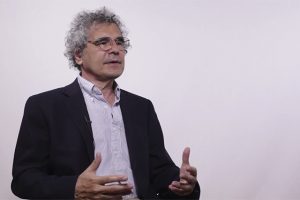Theories of Well-Being
Philosopher Daniel Hausman on the concepts of good, happiness, and the non-philosophical approach to the probl...
What makes social institutions work? When does a society become moral? Why should moral institutions leave promotion of the good to people and not do the promotion themselves? These and other questions are answered by Kendrick Professor of Philosophy at University of Arizona, David Schmidtz.
Imagine this: you are on a trolley, it’s a train, it’s rolling down the track. And you can see, as you are rolling ahead, that it is on course to run over five people who are in the way and you can’t get them out of the way, so your trolley is going to run over them and kill them. But you do have one thing that you could do: you can hit a switch that would divert the trolley onto a sidetrack. So you are looking at the sidetrack just as you’re about to hit the switch and you realize that there is one person on the sidetrack. And if you divert the trolley onto a sidetrack, you are going to kill that one person.
For the last 30-40 year this has been a fundamental puzzle that philosophers have thought about a lot. Do you get to change the course of the trolley? Do you get to move the trolley onto another track? And it appears, one way of describing it anyway is that you will be saving five lives and you will be deliberately killing one person. Do you get to kill one person in order to save five lives?
What do people need from a plummer? they need about one thing. What do people need from a carpenter? They need about one thing. What do people need from a government? They need roughly one thing. But, just because something is worth doing, it doesn’t mean the plummer should do it. Just because something is worth doing, it doesn’t mea that the carpenter should do it. And just because something is worth doing, it doesn’t mean that the government should do it.

Philosopher Daniel Hausman on the concepts of good, happiness, and the non-philosophical approach to the probl...

Philosopher Denis Bonnay on Kant's "Critique of Pure Reason", logical inferences, and attempts to divide math...

Psychologist Terry Hanley on humanism, creativity of a therapist, and making ethical decisions